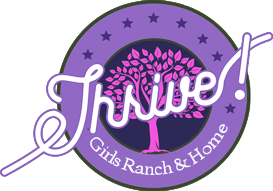Thrive Girls Ranch and Home understands that you want to find help for your struggling teen girl who struggles with adoption issues. We’re here to help at our affordable, specialized boarding school program, set in a safe, positive and structured environment near Austin, Texas. We enroll girls (ages 12-17 years) year-round, but we have a limited number of placements.
Please call (512) 545-2226 now.
Adoption and Development Issues
Parents of teenagers often face challenges connecting with their children during the adolescent years. And parents of adopted children especially need to be aware of additional factors that influence the teen’s development. Whether parents adopted the child as a newborn, or after the child moved from foster home to foster home, adoption experiences can interfere with a teen’s normal development.
“Adolescence is a time of significant brain development, as well as social and emotional development in the formation of identity and independence—both of which may be affected by adoption and/or early childhood trauma.” 1
“Teenagers experience gradual changes in the section of the brain (prefrontal cortex) that manages their abilities to reason, control impulses, limit inappropriate behaviors, and make good judgments. This development is not complete until the mid-twenties. In addition, the parts of the brain that involve critical thinking, understanding social cues, and empathizing with others (relating to other people’s perspectives and showing compassion) are also developing.” 1
“Chemical changes in the teenage brain (shifting levels of dopamine) encourage youth to seek risks and new challenges. This occurs at a time when the youth’s brain is less effective at thinking through consequences and controlling impulses. As such, teens need guidance from adults, opportunities for healthy risk-taking activities, and chances to learn from experience” 1
Parents of an adopted girl may not recognize the difference between their natural born teen, and an adopted teen’s mental development. Because a teen’s brain changes quickly, and all teens struggle to find personal identity and independence during this period of life, parents may also struggle to know what’s normal, and what’s not.
Adopted children that experienced previous neglect or abuse often need extra time and practice grow into independence, and learn life skills for success in the future.
Depression, anxiety, or relationship problems might indicate a response to trauma experienced before adoption, while in the care of their natural parents, or in foster care. Research tells us that the brain can be “rewired” and that ongoing relationships with supportive, caring adults can be powerful forces in helping the brain readjust (Jim Casey Youth Opportunities Initiative, 2011). 1
But if an adopted teen girl experiences extreme moods or emotions, or depression, anger, anxiety, or withdraws from relationships with family, friends or peers, she may need professional help.
As parents of an adopted teen girl search for counselors or out-patient treatment options nearby, they may also look into therapeutic boarding school programs that understand and know how to treat adoption and trauma-related issues in teens. And it’s important to find the best help for your troubled teen girl now, and start the healing process as her brain continues to develop.
Ready to Help You and Your Family
Thrive Girls Ranch and Home wants to help your family find healing and restoration, especially as your adopted teen girl struggles with mind-altering problems. Please give us a call today to find out more about our experienced team of therapists, counselors, and staff who know how to help adopted teens girls transform into responsible, respectful and gracious young women.
Our affordable therapeutic residential program in Central Texas features Teen Challenge Biblical advisors and mentors, a focus on academics, and a milieu of therapeutic activities, including equine therapy. Girls also benefit from vocational training and mentoring, and it is all designed to help girls transition into a life where they thrive!
Call (512) 545-2226 now. We look forward to speaking with you.
Sources:
https://www.childwelfare.gov/pubPDFs/parent_teenager.pdf










